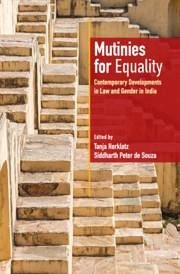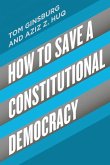Mutinies for Equality
Contemporary Developments in Law and Gender in India
Herausgeber: Herklotz, Tanja; de Souza, Siddharth Peter
Mutinies for Equality
Contemporary Developments in Law and Gender in India
Herausgeber: Herklotz, Tanja; de Souza, Siddharth Peter
- Gebundenes Buch
- Merkliste
- Auf die Merkliste
- Bewerten Bewerten
- Teilen
- Produkt teilen
- Produkterinnerung
- Produkterinnerung
Studies transformations in law and gender in modern India, proposing drivers of change are emerging from beyond traditional institutions.
Andere Kunden interessierten sich auch für
![The European Union After the Treaty of Lisbon The European Union After the Treaty of Lisbon]() The European Union After the Treaty of Lisbon55,99 €
The European Union After the Treaty of Lisbon55,99 €![How to Save a Constitutional Democracy How to Save a Constitutional Democracy]() Tom GinsburgHow to Save a Constitutional Democracy21,99 €
Tom GinsburgHow to Save a Constitutional Democracy21,99 €![A Conspiracy Against Obamacare A Conspiracy Against Obamacare]() R. BarnettA Conspiracy Against Obamacare21,99 €
R. BarnettA Conspiracy Against Obamacare21,99 €![A Conspiracy Against Obamacare A Conspiracy Against Obamacare]() R. BarnettA Conspiracy Against Obamacare38,99 €
R. BarnettA Conspiracy Against Obamacare38,99 €![Judging Free Speech Judging Free Speech]() H. KnowlesJudging Free Speech38,99 €
H. KnowlesJudging Free Speech38,99 €![The Rule of Law The Rule of Law]() J. MøllerThe Rule of Law38,99 €
J. MøllerThe Rule of Law38,99 €![The Rule of Law The Rule of Law]() J. MøllerThe Rule of Law38,99 €
J. MøllerThe Rule of Law38,99 €-
-
-
Studies transformations in law and gender in modern India, proposing drivers of change are emerging from beyond traditional institutions.
Hinweis: Dieser Artikel kann nur an eine deutsche Lieferadresse ausgeliefert werden.
Hinweis: Dieser Artikel kann nur an eine deutsche Lieferadresse ausgeliefert werden.
Produktdetails
- Produktdetails
- Verlag: Cambridge University Press
- Seitenzahl: 302
- Erscheinungstermin: 25. November 2021
- Englisch
- Abmessung: 236mm x 203mm x 23mm
- Gewicht: 499g
- ISBN-13: 9781108834063
- ISBN-10: 110883406X
- Artikelnr.: 61479395
- Herstellerkennzeichnung
- Libri GmbH
- Europaallee 1
- 36244 Bad Hersfeld
- gpsr@libri.de
- Verlag: Cambridge University Press
- Seitenzahl: 302
- Erscheinungstermin: 25. November 2021
- Englisch
- Abmessung: 236mm x 203mm x 23mm
- Gewicht: 499g
- ISBN-13: 9781108834063
- ISBN-10: 110883406X
- Artikelnr.: 61479395
- Herstellerkennzeichnung
- Libri GmbH
- Europaallee 1
- 36244 Bad Hersfeld
- gpsr@libri.de
Acknowledgements; Introduction Tanja Herklotz and Siddharth Peter de Souza;
Part I. Systems of Inequality: 1. Family matters, gender matters: courts on
the rule against restraints on alienation Krithika Ashok; 2. Missing women
in the Indian judiciary: the inadequacies of the judicial appointment
process Siddharth Peter de Souza and Medha Srivastava-Kehrer; 3. Is the
Supreme Court cherry-picking its gender battles? Jayna Kothari; 4.
Juxtaposing equality?: Muslim women's rights in the normative realm of
secularism and personal law in India Katharina Wommelsdorff; 5. Is
sexuality anti-Indian?: Reflections on obscenity in contemporary Indian
popular discourse Fritzi-Marie Titzmann; Part II. Battles for Equality: 6.
Armed with the Constitution: feminist litigation on Indian family law Tanja
Herklotz; 7. Nikah Halala: The petition, the promise and the politics of
personal law Saumya Saxena; 8. The politics of erotic labour: a case study
of Mumbai bar dancers Sameena Dalwai; 9. Reactionary executive versus
deliberative legislature: the case of how the legislature championed
compensation for reproductive labour while regulating surrogacy Mandira
Kala; 10. Interrogating the freedoms of queer liberation in India Jason
Keith Fernandes; Part III. Realising Equality: 11. The politics of
regulating adult sexuality through the institution of marriage: reflections
on queer experiences from India Sourav Mandal; 12. Conditions of
possibility: law, patriarchy and single motherhood in India Saptarshi
Mandal; 13. Turning to the state: between processing disputes and
protecting autonomy Kalindi Kokal; 14. Towards an egalitarian workplace:
developments in anti-sexual harassment law Poornima Hatti and Aparna Ravi;
About the contributors; Index.
Part I. Systems of Inequality: 1. Family matters, gender matters: courts on
the rule against restraints on alienation Krithika Ashok; 2. Missing women
in the Indian judiciary: the inadequacies of the judicial appointment
process Siddharth Peter de Souza and Medha Srivastava-Kehrer; 3. Is the
Supreme Court cherry-picking its gender battles? Jayna Kothari; 4.
Juxtaposing equality?: Muslim women's rights in the normative realm of
secularism and personal law in India Katharina Wommelsdorff; 5. Is
sexuality anti-Indian?: Reflections on obscenity in contemporary Indian
popular discourse Fritzi-Marie Titzmann; Part II. Battles for Equality: 6.
Armed with the Constitution: feminist litigation on Indian family law Tanja
Herklotz; 7. Nikah Halala: The petition, the promise and the politics of
personal law Saumya Saxena; 8. The politics of erotic labour: a case study
of Mumbai bar dancers Sameena Dalwai; 9. Reactionary executive versus
deliberative legislature: the case of how the legislature championed
compensation for reproductive labour while regulating surrogacy Mandira
Kala; 10. Interrogating the freedoms of queer liberation in India Jason
Keith Fernandes; Part III. Realising Equality: 11. The politics of
regulating adult sexuality through the institution of marriage: reflections
on queer experiences from India Sourav Mandal; 12. Conditions of
possibility: law, patriarchy and single motherhood in India Saptarshi
Mandal; 13. Turning to the state: between processing disputes and
protecting autonomy Kalindi Kokal; 14. Towards an egalitarian workplace:
developments in anti-sexual harassment law Poornima Hatti and Aparna Ravi;
About the contributors; Index.
Acknowledgements; Introduction Tanja Herklotz and Siddharth Peter de Souza;
Part I. Systems of Inequality: 1. Family matters, gender matters: courts on
the rule against restraints on alienation Krithika Ashok; 2. Missing women
in the Indian judiciary: the inadequacies of the judicial appointment
process Siddharth Peter de Souza and Medha Srivastava-Kehrer; 3. Is the
Supreme Court cherry-picking its gender battles? Jayna Kothari; 4.
Juxtaposing equality?: Muslim women's rights in the normative realm of
secularism and personal law in India Katharina Wommelsdorff; 5. Is
sexuality anti-Indian?: Reflections on obscenity in contemporary Indian
popular discourse Fritzi-Marie Titzmann; Part II. Battles for Equality: 6.
Armed with the Constitution: feminist litigation on Indian family law Tanja
Herklotz; 7. Nikah Halala: The petition, the promise and the politics of
personal law Saumya Saxena; 8. The politics of erotic labour: a case study
of Mumbai bar dancers Sameena Dalwai; 9. Reactionary executive versus
deliberative legislature: the case of how the legislature championed
compensation for reproductive labour while regulating surrogacy Mandira
Kala; 10. Interrogating the freedoms of queer liberation in India Jason
Keith Fernandes; Part III. Realising Equality: 11. The politics of
regulating adult sexuality through the institution of marriage: reflections
on queer experiences from India Sourav Mandal; 12. Conditions of
possibility: law, patriarchy and single motherhood in India Saptarshi
Mandal; 13. Turning to the state: between processing disputes and
protecting autonomy Kalindi Kokal; 14. Towards an egalitarian workplace:
developments in anti-sexual harassment law Poornima Hatti and Aparna Ravi;
About the contributors; Index.
Part I. Systems of Inequality: 1. Family matters, gender matters: courts on
the rule against restraints on alienation Krithika Ashok; 2. Missing women
in the Indian judiciary: the inadequacies of the judicial appointment
process Siddharth Peter de Souza and Medha Srivastava-Kehrer; 3. Is the
Supreme Court cherry-picking its gender battles? Jayna Kothari; 4.
Juxtaposing equality?: Muslim women's rights in the normative realm of
secularism and personal law in India Katharina Wommelsdorff; 5. Is
sexuality anti-Indian?: Reflections on obscenity in contemporary Indian
popular discourse Fritzi-Marie Titzmann; Part II. Battles for Equality: 6.
Armed with the Constitution: feminist litigation on Indian family law Tanja
Herklotz; 7. Nikah Halala: The petition, the promise and the politics of
personal law Saumya Saxena; 8. The politics of erotic labour: a case study
of Mumbai bar dancers Sameena Dalwai; 9. Reactionary executive versus
deliberative legislature: the case of how the legislature championed
compensation for reproductive labour while regulating surrogacy Mandira
Kala; 10. Interrogating the freedoms of queer liberation in India Jason
Keith Fernandes; Part III. Realising Equality: 11. The politics of
regulating adult sexuality through the institution of marriage: reflections
on queer experiences from India Sourav Mandal; 12. Conditions of
possibility: law, patriarchy and single motherhood in India Saptarshi
Mandal; 13. Turning to the state: between processing disputes and
protecting autonomy Kalindi Kokal; 14. Towards an egalitarian workplace:
developments in anti-sexual harassment law Poornima Hatti and Aparna Ravi;
About the contributors; Index.








